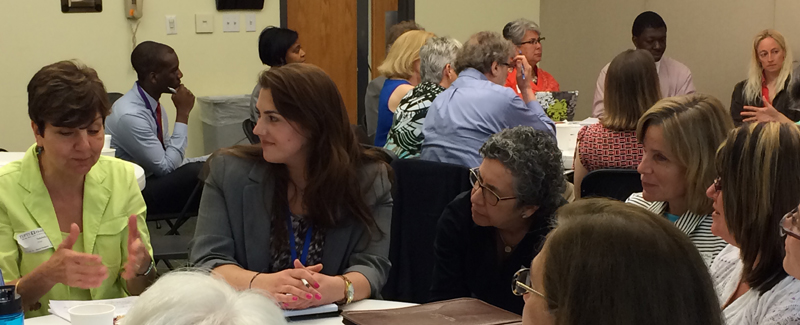By Brianne Miers, Senior Manager, Marketing and Communications, Root Cause
Most non-profit organizations are constantly struggling with how to balance the need to get the word out on the good work they do with the realities of their limited staff time and funding. Recognizing this was the case for many of its grantees, the Tufts Health Plan Foundation invited me and several other experts to deliver a workshop one morning last week. Our goal was to provide the nearly 50 attendees from Massachusetts and Rhode Island nonprofits with some concrete advice on how to tackle a variety of communications challenges.
Here is just a snapshot of what attendees learned:
- It’s important to have a solid plan in place. The word “planning” is often intimidating for nonprofits because it implies time and money; however, in my presentation, I stressed that an effective communications plan is not one that sits in a big binder on a shelf. Rather, it’s a living document that can be developed internally to serve as an organization’s “road map.” Rooted in a communications audit – a self-assessment that gathers valuable input from internal and external audiences – it captures its guiding language – mission, vision and values statements, and key messages – along with the activities that will be used to communicate and connect with stakeholders, and the goals and metrics for determining success. (See Getting Started with Communications Planning)
- It’s important to have a professional visual image. My colleague, Susan Musinsky, director of the Social Innovation Forum, presented several striking logo redesigns that she’s collected over 10+ years of working with social innovators and entrepreneurs that better reflected the organizations’ missions and were completed with minimal resources. She also talked about the success these organizations have had with presenting funders with graphic representations of their inputs, outputs and outcomes to illustrate key data and concepts in a clear and compelling way (See What Makes a Successful Infographic?).
- It’s important to share your stories. Nonprofits have so many good stories to tell, yet many have a hard time keeping up with collecting and using these stories in their outreach activities. Stacey Mann, communications officer at the Tufts Health Plan Foundation, reviewed four types of stories organizations should be keeping an out eye for—values (purpose), people (staff, clients, volunteers, donors, etc.), founder/founding (history) and impact (data)—along with some tips for collecting them, including starting each staff meeting with telling one new story. She also reinforced the importance of sharing stories regularly on social media to engage current supporters and gain new supporters (See Why Nonprofits Need to Be Storytellers)
- It’s important to leverage relationships. Events can be very time consuming and expensive for nonprofits to execute. Raymond Santos, community relations director at Ethos, wanted to celebrate the organization’s 40th anniversary last year without breaking the bank. By reaching out to his personal contacts – including his wedding caterer and a photographer friend of his wife’s – he was able to receive high-end services at a discounted rate. Also, because the executive director’s friend designed the invitation, Ethos was allowed to replicate the design internally for other materials and print them through an online service at a significant savings. In the end, Ray pulled off a successful “friendraiser” within his budget that drew nearly 400 attendees and significantly expanded the organization’s donor base (See Black Tie Optional: A Complete Special Events Resource for Nonprofit Organizations).
What are your tips for getting your message out? Or, what are you struggling with? Share your stories here and get advice from colleagues in the field. You can also review the slides from the workshop.
This marketing workshop was the second in the Tufts Health Plan Foundation’s new capacity-building speaker series for nonprofits.

